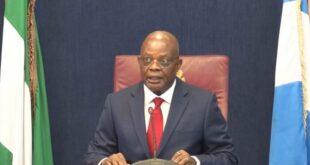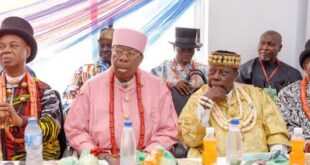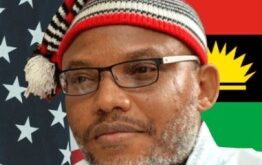By Joel Anekwe
For the Goi community in Gokana Local Government Area of Rivers State, their plight can aptly be described as a wicked twist of fate, as the river that had hitherto been their source of sustenance, wealth and pride, suddenly became the source of their worst nightmare.
The community does not have crude oil deposit, neither does it have any pipeline crossing it, or any known oil facility, other than its rich river and farmlands on which natives depend to live life to the fullest.
But all that turned into a curse that has sadly refused to go away for over a decade now, as the river in 2008, or there about, brought huge oil pollution that sacked the entire community, scattering them all over neighbouring communities as refugees.
Goi is the traditional settlement of the Gokana people, founded by King Gbere Sakoo, according to history. King Sakoo later moved to Giogookoo which is the current seat of power of the Gokana Kingdom of Rivers State, leaving the rulership to his son, late King Kobani.
Goi, a predominantly farming and fishing community, and once the business hub of Gokana people lies in waste today as there is no life in the ancient seat.
It is one of the many Ogoni communities that have been devastated by crude oil exploration and exploitation. But its case is peculiar and pathetic, because while the pollution in other communities was from their oil wells and related facilities, Goi’s was by the accident of its physical location.
Goi is one of the oldest communities in Ogoniland and in present-day Gokana Local Government Area.
The villagers had lived a peaceful and productive life until 2008 when a major oil spill that occurred in Bodo town, flowed through Okrika, Andoni, Bonny, K-Dere, and settled permanently in Goi, devastating fish ponds, creeks, and rivers and all businesses by the people and forcing the entire villagers to flee into Mughuo, where they are still taking refuge till date.
Celestine Akpobari, an environmentalist, and national coordinator of Ogoni Solidarity Forum, speaking on the fate of Goi blamed oil multinational, Shell Petroleum Development Company (SPDC), for the oil pollution that hit the area, and expressed sadness that the Federal Government and Shell had not thought it necessary to pay compensation to the community.

“Goi is a community in Gokana Local Government Area. From the history of Ogoni, we were told that Goi was the first community to accommodate people in Gokana, but today it is the most polluted community in Niger Delta. There is no other community in the Niger Delta that pollution has actually chased people away and destroyed the entire livelihood and the economic activities of the people apart from Goi.
“So as a result of the outbreak of fire arising from the spill, the schools, the poultry, bakery, and the community life was completely destroyed, and this led the people to migrate to other communities.
“Till today, the Goi community people are still struggling to get compensation for their economic activities that the oil destroyed,” he said.
Akpobari explained that “the unfortunate thing about the community is that Goi does not have oil and oil well. Goi does not have any pipeline. Goi does not have any manifold, but the people are being accused of sabotage. You cannot sabotage what is not in your community.
“If we have a government that actually cares for its citizens; if we actually have an oil company that loves the community people where they are working, I think it is time to attend to the plight of Goi people.
“I say so because Bodo people have been compensated. If you are not from Gokana, you will not know the difference between Goi and Bodo, because there is no boundary. So, for you to pay Bodo and you refuse to pay Goi amounts to injustice.
“There are special sea foods that women used to harvest, like the periwinkles, salmon fish, etc that are the major sources of income here, but because of the oil spill, the mangrove forest that houses the fishes and other rich sea foods are no more. This means that the people can no longer fish and Ogoni people are predominately fishermen/women and farmers,” he said.
According to Akpobari, “through the actions of Environmental Rights Action/Friends of the Earth International, Goi took the Shell to court at The Hague, and they lost the round one, and are now on appeal. Another case has also been instituted against Shell right here in Nigeria.”
Pa Kii Bogba, 102-year-old fisher man we met at the river bank with his colleague corroborated Akpobari’s report of the devastation of the oil spills on the Goi economy and livelihood, regretting that the river which was their main source of sustenance could no longer provide any sea food.

He said: “I was born in this village (Goi), but now I reside in Moghuo as a refugee and a stranger, and if at my age I am being subjected to the miserable life associated with refugees, the world is no longer a sweet place to live in.
“The oil spill drove all of us away, and since then we have not been compensated by Shell,” he said.
Goi had remained in ruins since 2008 when the oil spill forced the villagers to flee their ancestral home. A recent visit to the community revealed that pollution has been further worsened by the activities of security agents who had set the beach on fire ostensibly destroying stolen crude and the equipment of illegal refiners.
When in June 2016 the Vice President Prof. Yemi Osinbanjo, formally flagged-off the cleanup of Ogoniland in Bodo town, Gokana LGA the people’s hope of returning to their homeland was heightened. But more than two years after the flag-off exercise, many people have expressed worry that the cleanup exercise was yet to fully commence fearing that the flag off might just have been a political gimmick.
Following the delay in the commencement of the cleanup exercise, Bogba insists that Shell should compensate the people of Goi, more so, when the company had compensated the people of Bodo town equally affected by the oil leakage.
Also an environmentalist and director, Mother of the Earth Foundation (HOMEF), Nnimmo Bassey, have urged the Nigerian government to immediately provide alternative livelihood and portable water for impacted communities in Ogoniland.

Speaking at Bodo, after visiting some oil impacted sites, he declared that there was no reason why the government and relevant authorities should delay the provision of portable water to the people since it was recommended as an emergency measure.
“It is really troubling that we don’t have alternative clean water for the Ogoni people. That should have been done like yesterday, even from 2011. That was an emergency response, and that it is lingering is unfortunate. But I understand that there is also a bid for that, but that should have been done a long time ago,” Bassey said.
He also urged that the people should be patient with the Hydrocarbon Pollution Remediation Project (HYPREP), adding that it was the best option to carry out the cleanup of Ogoniland as recommended by the United Nation’s Environmental Programme (UNEP).
He made the assertion against the backdrop of claims by some people that HYPREP is not ready, or does not have the capacity to carry out the cleanup of Ogoniland as recommended by the United Nation’s Environmental Programme (UNEP).
Acknowledging that the UNEP had recommended the establishment of the Ogoni Restoration Agency, he noted that the cleanup of Ogoniland was only a seed for the wider cleanup of the entire Niger Delta area affected by pollution, hence the establishment of HYPREP by the Federal Government.
The director of HOMEF stated that though UNEP recommended the establishment of the Ogoni Restoration Agency for the cleanup of Ogoniland, it was left to government to accept what would work better because the cleanup would not just stop at Ogoni, but extend to other parts of the region also heavily polluted as Ogoniland.
He said: “I don’t believe that HYPREP should be scrapped. HYPREP is a good idea, it is the best that we have. We can’t afford to go back to square one, because if you scrap HYPREP and abort the Ogoni Cleanup, all of us might as well just go home and say okay, we are finished.”
According to him, “this is the lifeline we have and we have to do all we can to ensure that HYPREP operates the way it ought to operate, hold them accountable, and ensure they expand the work to other parts of the Niger Delta.”
The environmentalist who visited the impacted sites at Goi community expressed “extreme sadness” that the spill in the areas was being made worse by the Joint Military Task Force that burn boats, badges and stolen oil products on the shores of the river.
“This has made me very sad because we have to find a better way of handling these kinds of things. When a boat is caught with stolen products you don’t have to set it on fire.
“You can keep the boat somewhere and dispose the products in a way that is safe. But the continuous burning of either illegal refineries or stolen crude or badges and just pouring that into the environment compounds the problem and really makes it difficult to see the way out of the mess,” he stated.
Bassey, who is also a member of the governing board of HYPREP said; “I think right now, we are seeing both talk and action, and we can never stop talking about the cleanup because it is a learning process.
“There is nowhere in the world where there has been this incident of hydrocarbon pollution that has been left to fester for so long. Now, in that period since the official flag off, my interpretation is that there is an indication of seriousness. But what has happened? You can’t have the cleanup without having the structures to supervise it and handle it.”
He explained that HYPREP has gone to great lengths to put structures in place for the physical space and shovel work of the clean up to commence, but regretted that provision of potable water for the people recommended as an emergency measure since 2011 has not been done.
 PH Mundial – Port Harcourt Online Newspaper News Across The Region
PH Mundial – Port Harcourt Online Newspaper News Across The Region




